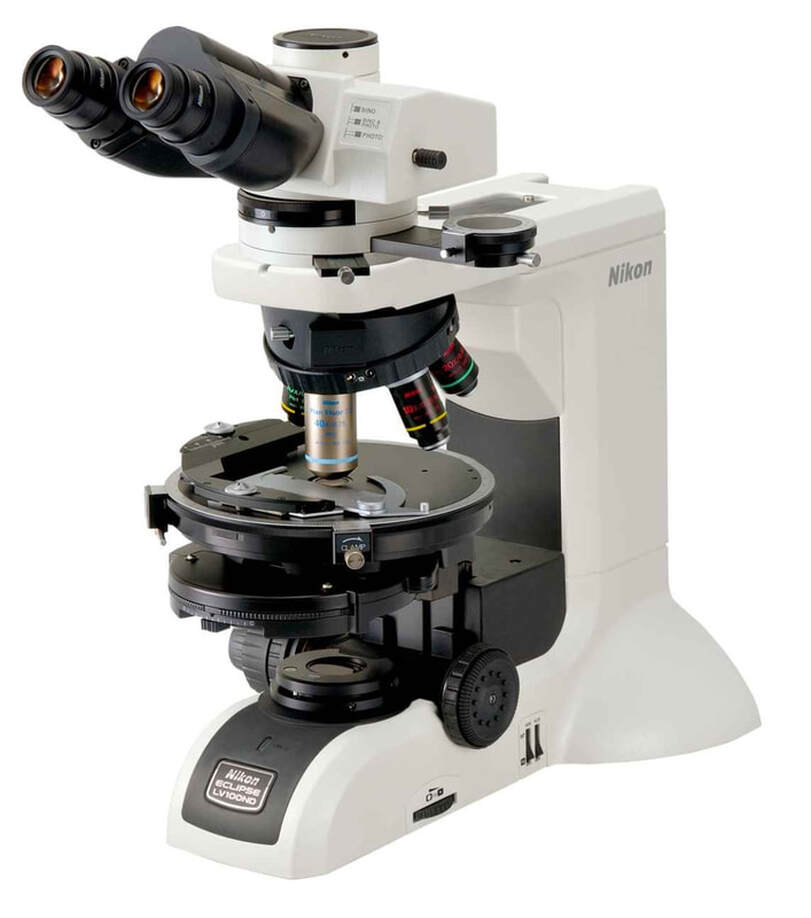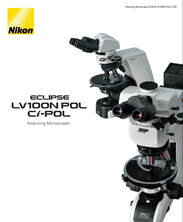Nikon LV100ND POL / DS Microscope
Microscopes for dispersion staining allow for qualitative analysis and identification of asbestosPolarized light microscopes can measure the properties of asbestos, such as refractive indices, birefringence, retardation, extinction angles, pleochroism and signs of elongation, helping in the identification of asbestos. LV100ND POL/DS is a high-performance, polarized light microscope with accessories that enable dispersion staining observation at up to 400x magnification.
Advanced polarized light microscopy under both diascopic and episcopic illumination.
Nikon's Eclipse polarizing microscopes are renowned for their ability to produce brighter, clearer, and higher contrast images. The LV100 POL, available in diascopic and episcopic microscope illumination types, continues this tradition and offers a completely reengineered base for even easier operation. It also features an exclusive high-intensity halogen light source, which delivers brighter images, lower power consumption and less heat generation, thereby reducing the chance of heat-induced focus drift.
Key Features
Diascopic (Transmitted) Light Source
The new high intensity 50W halogen light source incorporates a fly-eye lens design that outputs more light than a 100W lamp. The greater brightness is achieved by optimizing the lamp filament size and optically expanding the size of the light source within the pupil illumination fulfillment.
Lead and Arsenic Free Objective Lenses
The new CFI LU Plan Fluor EPI P objective series uses eco-glass that is manufactured to the same specifications as Nikon's proprietary infinity optics (CFI60) system, but without harmful substances such as lead and arsenic.
30mm Focusing Stroke
The focus stroke has been improved to 30mm, facilitating observation of tall samples.
Reversed Centering Nosepiece
Up to five objectives, ranging from 4x to100x can be mounted to the nosepiece and all five objectives are centerable. The nosepiece is also provided with a DIN compliant compensator slot and it accepts various compensators for advanced quantitative measurements.
Bertrand Lens Incorporated into Design of Intermediate Tube
The Bertrand lens enables both the observation and capture of conoscopic and orthoscopic images. The Bertrand lens is also focusable and centerable.
Rotatable Slider Type Analyzer
The high precision slider-type analyzer located in the intermediate tube is rotatable for a full 360°.
Reduced Focus Drift
Focus drift resulting from light source heat is greatly reduced by virtue of the lower power consumption and heat generated from the new diascopic light source.
Diascopic and Episcopic Polarization
Both Diascopic (transmitted) and Episcopic (reflected) polarization observations are possible by mounting the LV-UEPI universal epi-illuminator.
Episcopic DIC (Differential Interference Contrast)
By mounting the LV-UEPI universal epi-illuminator and optional universal-type nosepiece and DIC accessories including objectives, Episcopic DIC microscopy is possible.
High-Precision Rotating Stage
The stage is large-sized, pre-adjusted and click-stops in 45° increments, making it extremely accurate and easy to rotate. Because the stage is designed to be supported from the bottom of the microscope near the optical axis and incorporates steel cross roller guides, it is twice as stable and durable as conventional stages.
Vibration Resistant Stage
The large sized circular stage is supported near the optical axis and incorporates steal cross roller guides making the stage twice as stable and durable as conventional models. The stage is also extremely accurate, centerable to the optical axis, and provides click-stops at 45° increments.
Diascopic (Transmitted) Light Source
The new high intensity 50W halogen light source incorporates a fly-eye lens design that outputs more light than a 100W lamp. The greater brightness is achieved by optimizing the lamp filament size and optically expanding the size of the light source within the pupil illumination fulfillment.
Lead and Arsenic Free Objective Lenses
The new CFI LU Plan Fluor EPI P objective series uses eco-glass that is manufactured to the same specifications as Nikon's proprietary infinity optics (CFI60) system, but without harmful substances such as lead and arsenic.
30mm Focusing Stroke
The focus stroke has been improved to 30mm, facilitating observation of tall samples.
Reversed Centering Nosepiece
Up to five objectives, ranging from 4x to100x can be mounted to the nosepiece and all five objectives are centerable. The nosepiece is also provided with a DIN compliant compensator slot and it accepts various compensators for advanced quantitative measurements.
Bertrand Lens Incorporated into Design of Intermediate Tube
The Bertrand lens enables both the observation and capture of conoscopic and orthoscopic images. The Bertrand lens is also focusable and centerable.
Rotatable Slider Type Analyzer
The high precision slider-type analyzer located in the intermediate tube is rotatable for a full 360°.
Reduced Focus Drift
Focus drift resulting from light source heat is greatly reduced by virtue of the lower power consumption and heat generated from the new diascopic light source.
Diascopic and Episcopic Polarization
Both Diascopic (transmitted) and Episcopic (reflected) polarization observations are possible by mounting the LV-UEPI universal epi-illuminator.
Episcopic DIC (Differential Interference Contrast)
By mounting the LV-UEPI universal epi-illuminator and optional universal-type nosepiece and DIC accessories including objectives, Episcopic DIC microscopy is possible.
High-Precision Rotating Stage
The stage is large-sized, pre-adjusted and click-stops in 45° increments, making it extremely accurate and easy to rotate. Because the stage is designed to be supported from the bottom of the microscope near the optical axis and incorporates steel cross roller guides, it is twice as stable and durable as conventional stages.
Vibration Resistant Stage
The large sized circular stage is supported near the optical axis and incorporates steal cross roller guides making the stage twice as stable and durable as conventional models. The stage is also extremely accurate, centerable to the optical axis, and provides click-stops at 45° increments.
Eclipse LV100 Pol Specifications
Main Body - Optical System: CFI60 infinity
Main Body Illumination:12V-50W halogen lamp; 12V-50W DC transformer built-in;
Diascopic/Episcopic illumination changeover switch; Fly-eye lens; NCB11, ND8 filters built-in; 12V-100W type optional (requires external power supply)
Main Body - Focusing: Coaxial coarse/fine focus knob; Focus stroke: 30mm; Coarse: 14mm per rotation; Fine: 0.1mm; Minimum reading: in 1µm increments
Eyepiece:10x (F.O.V. 22mm), CM type with crosshair and micrometer scale
Eyepiece Tube:P-TT Trinocular Tube for polarizing microscopy; P-TB Binocular Tube for polarizing microscopyIntermediate Tube:Built-in focusable Bertrand lens removable from optical path; Switchable Conoscopic/Orthoscopic observations; Analyzer built-in; Plate/compensator slotAnalyzer:360° rotary dial; Minimum reading angle 0.1°
Nosepiece: Reversed centering quintuple nosepiece (detachable); DIN slot
Stage: Top-grade dedicated circular graduated stage. Rotatable 360° horizontally; can be fixed at a specific position. Graduated 360° (in 1° increments); Click stops each 45°. Attachable mechanical stage: 35 x 25mm travel; vernier 0.1mm
Condenser: Dedicated strain-free swing-out type; P Achromat N.A. 0.9
Polarizer: Fixed to the bottom of the condenser holder; Scale
Objectives:CFI P Achromat 4x, 10x, 20x, 40x, 100x, CFI LU Plan Fluor Epi P 5x, 10x, 20x, 50x,100x
Episcopic Illuminator: LV-UEPI Universal Epi-illuminator accommodates a 12V-50W illumination transformer. 12V-100W type optional.(requires external power supply)
Compensators: Standard 1/4 λ & tint plate, quartz wedge or Senarmont compensator can be inserted into intermediate tube slot
Power Consumption: 1.2A/75W
Weight: Approx. 17kg (37.4 lbs) (standard trinocular set)




